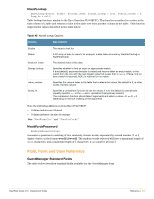Dell PowerConnect W Clearpass 100 Software 3.9 Deployment Guide - Page 465
Table 46, aX'. Example: to delay activation time by 2 days, use the value
 |
View all Dell PowerConnect W Clearpass 100 Software manuals
Add to My Manuals
Save this manual to your list of manuals |
Page 465 highlights
Table 46 GuestManager Standard Fields (Continued) Field Description modify_expire_usage modify_password modify_schedule_time multi_initial_sequence multi_prefix String. Value indicating how to modify the expire_usage field. This field is only of use when editing a visitor account. It may be set to one of the following values: "expire_usage" to set the cumulative usage expiration timer to the value in the expire_usage field; "plus X" or "minus X", where X is a time measurement, to extend or reduce the cumulative usage expiration timer by X (seconds, but may have a "ywdhms" suffix to indicate years, weeks, days, hours, minutes, seconds respectively); A number, to set the cumulative usage expiration time to the value specified; Any other value to leave expire_usage unmodified. This field controls account modifications; it is not stored with the visitor account. String. Value indicating how to modify the account password. It may be one of the following values: "random_password" to use the password specified in the random_password field; "reset" to create a new password, using the method specified in the random_password_method field (or the global defaults, if no value is available in this field); "password" to use the value from the password field; Any other value leaves the password unmodified. This field controls account creation and modification behavior; it is not stored with created or modified visitor accounts. String. Value indicating how to modify the schedule_time field. It may be one of the following values: "none" to disable the account activation time; "now" to activate the account immediately; "schedule_time" to use the activation time specified in the schedule_time form field (normally a UNIX time, but may be 0 to disable activation time); "schedule_after" to set the activation time to the current time plus the number of hours in the schedule_after field; "plus X", where X is a time measurement, to extend the activation time by X. The time measurement is normally hours, but may have a "ywdhms" suffix to indicate years, weeks, days, hours, minutes, or seconds, respectively. Alternatively, this operation may be written equivalently as '+X', 'pX', 'plusX', 'add X', 'addX', or 'aX'. Example: to delay activation time by 2 days, use the value +2d. "minus X", where X is a time measurement, to reduce the activation time by X. See above for details about specifying a time measurement. Alternatively, this operation may be written equivalently as '-X', 'mX', 'minusX', 'sub X', 'subX', or 'sX'. Example: to bring forward activation time by 12 hours, use the value -12h. A time measurement "X", to set the activation time to the current time plus X. A time and date specification, to set the activation time to that time and date. Many different formats are specified; for clarity it is recommended that a standard format such as ISO-8601 is used ("YYYY-MM-DD hh:mm:ss" format). Any other value to leave schedule_time unmodified. This field controls account creation and modification behavior; it is not stored with created or modified visitor accounts. Integer. Initial sequence number. This field is used when creating guest accounts and the random_username_method field is set to "nwa_sequence". If this field is not set, the next available sequence number for the given multi_prefix is used. Sequence numbering will start with 0 if no initial sequence number has been set. String. The prefix of each username generated when creating guest accounts and the random_username_method field is set to "nwa_sequence". ClearPass Guest 3.9 | Deployment Guide Reference | 465















